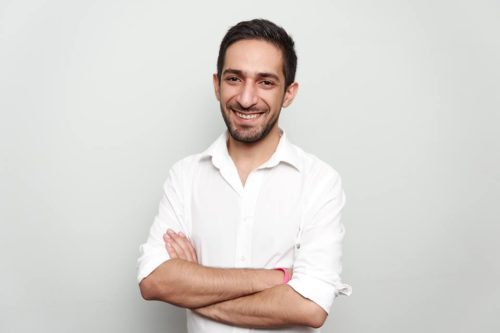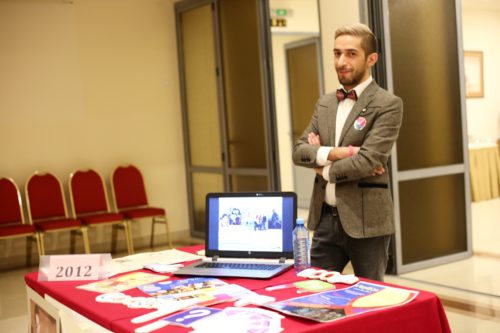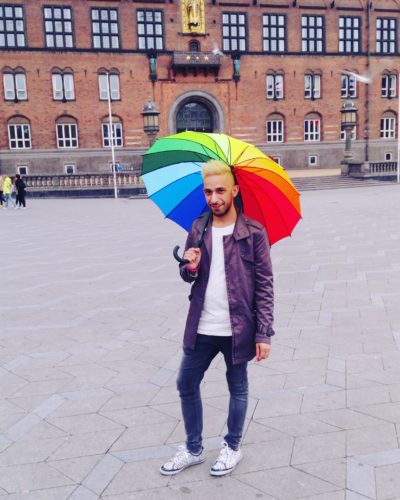Unlike perhaps any other illness, HIV is intertwined with such deep political implications. To have HIV is not just to have an illness that affects the body but to also have a disease that marks you. It is to have your story taken away from you; to be filled with the assumption of your sexuality, your life choices, your risk to society and, painfully, your right to be treated with the love and respect that everyone deserves. HIV’s legacy is not just the story of an illness that reshaped lives but the willful indifference of governments and large segments of the medical community that led to the deaths of millions. Despite the medical advancements since the ’70s and ’80s, the stigma still surrounds HIV, leaving those afflicted with it exiled to the margins of society, through no fault of their own.
Armenia is just one of the many countries across the post-Soviet sphere where fear and misunderstanding of individuals with HIV sustains hatred and exclusion. Approximately 3,600 individuals have contracted HIV in Armenia, according to the Ministry of Health. More disconcertingly, it is believed that almost half of that figure do not know they have HIV, having not been properly tested. Just under half of those HIV diagnoses have transformed into AIDS. Both the lack of testing and the high rate of AIDS in Armenia is a byproduct of a lack of sexual education as a consequence of the fear and hatred directed towards individuals living with HIV.
HIV does not have to mean death however. A cocktail of antiretroviral drugs can ensure a generally healthy life where viral levels are reduced to minimal levels so that the disease cannot be passed on. Nonetheless, people in Armenia and elsewhere are still forced to live in the shadows. In an attempt to help detoxify this conversation, Postpravdamagazine spoke to the amazingly friendly and charming Armen Aghajanov about living with HIV in Armenia. Armen is based in Kyiv, Ukraine, and is the strategic information specialist for the charity East Europe and Central Asia Union of People Living with HIV (ECUO). He is also an activist within the gay community and a proactive member of the community organization PINK Armenia.

Understandably, contracting HIV changes lives. I imagine after your diagnosis, your sense of self changed. Can you please speak about how it felt when you were initially diagnosed with HIV?
When I learned of my HIV positive status, back in 2014, when I was 23, I felt emptiness. I don’t want to flatter myself, but I was and now am a slender young man, no different from my peers. My life was going really well: I had many friends, warm family relationships, a good job, and love – the most important thing. It was a calm, pleasant life. What could be better? But no. All this was replaced with this HIV positive diagnosis and the resulting feeling of emptiness.
I had never been afraid of HIV/AIDS. I didn’t get any education on it in school or at home, or with peers. I knew that such people, such a disease existed, but it was far from me since I didn’t have any acquaintances with HIV/AIDS, and neither did my acquaintances.
When I got diagnosed, it became very close and I wasn’t protected from it at all. The emptiness was replaced with anger, resentment, hatred, disgust towards both myself and my environment. I hated myself, I totally hated myself, from the bottom of my soul. I couldn’t think of myself or look at myself without feeling hatred. I abhorred myself. I was angry with myself and others. I hated everyone. I was ashamed, as I thought that “HIV cannot touch good people.” I was afraid to be isolated – who would communicate with someone who is HIV positive?
I had never thought about how I should treat somebody who has HIV, how their life changes, how the disease increases the desire of having babies, like the fight against the risk that the infection passes to the baby redefines the idea of giving a new life. I avoided communication with friends and family out of fear and shame, that others will abhor me.
Even though I had a basic knowledge about HIV/AIDS, and was partly involved in activism fighting HIV/AIDS, for me it was shocking to realize that I was HIV positive.
It needed some time, in my case not much time, and support from the people who loved me, my friends and the person I loved.
Since getting diagnosed with HIV a lot has changed, the attitude towards myself, towards my surroundings, the world has changed a lot. I’ve had to rethink almost everything, my attitude towards the world, peace, life, and I have had to rebuild my dreams. I can say that it helped me to grow up faster and become more involved in activism and the fight against stigmatization, discrimination and injustice, and for equality.
It would appear that, with all the medical advancements that have been made, the most deadly aspect of HIV now is the stigma that surrounds it. Have you come across much discrimination because of your condition in Armenia?
Of course I face discrimination in Armenia. I’m a HIV positive, gay person who speaks openly about it. This is a country where, according to statistics, there is 90% homophobia in society, and the most common stereotype about gay men is that they have HIV.

I face stigma and discrimination both in the LGBT community and in society in general. Why? Because basically people don’t have enough knowledge of HIV and on living with HIV. Even though the LGBT community and society knows the various ways of transmitting HIV, they don’t have a knowledge of treating the disease, and they don’t know people living with it. In my opinion the best solution is to get to know people who live with HIV, in this case you will see and understand that really there is no difference. You just need to get your treatment and that’s all. Nothing else is different. I’m the same person, I’m sad because of almost the same reasons. The same things could make me happy. I face the same problems as others face in society, and I also want to make life in Armenia better.
One of the main reasons why I decided to speak openly about living with HIV was, and is, to show to the rest of society that we exist, and that there is nothing to be ashamed or afraid of. I’m as normal as they are. I think that if society was to see HIV positive people with open faces more often, it would stop being a problem for them, and they would stop stigmatizing and discriminating. There is just a need to understand that we, or me, as a HIV positive person, are not different or something mysterious.
This is a quote from the story which I wrote back in 2016, which also partly gives an answer to the question. If needed you can take it as well:“I am the one, they don’t want to hear from. I am one of the people, who is being ignored. I’m one of them, whom others abhor, hate or are scared of, and sometimes deny that such status exists. But anyway, I’m one of them and we exist. How to treat someone with HIV? “Love is the answer” – they sang in a song. Love, care, support, stable relationships, acceptance – here is what could be the normal attitude to my status. That is what helped me move forward. But how to love? How to really love, when you are HIV positive? How to be loved? How to do it in society, where HIV positive people should hide their status? To love in a society, where your existence is excluded. To love in a society, where people do not really know what HIV is. Still, I manage to love. I love the life, the people, I love the feeling of love.
Is it possible to love an HIV positive person? Is it possible to live with them, to share the bed and have family? It is possible. Sometimes you just have to be with him. Maybe give him a hug, kiss him or just talk to him. He just may be in need of love and warmth, sincerity and kindness. The warmth can help him accept and love himself rather than hate and reject or feel shame and fear.
Otherwise the person can stay alone – with himself, HIV and emptiness.”
After so many years of inaction and indifference, HIV no longer means the automatic death sentence that it once did. However, it demands that individuals living with HIV must have access to a host of medications. How accessible is that medication in Armenia? Does the state give support?
Antiretroviral treatment is available in Armenia, but is currently financed within the frames of the Global Fund to Fight AIDS, Tuberculosis and Malaria grant. Treatment is provided according to the local guidelines, when the CD4 count is 500 cells or less. The question is what kind of treatment is provided and how. Generic medication is provided in Armenia, with mainly old treatment regimens, basically containing Efavirenz. It is well-known that Efavirenz is quite an effective drug, but it can cause serious, life-threatening side effects. These include serious mental health problems, liver problems, and severe rashes.
In general there is no mechanism for resistance tests in Armenia, to get to know prior to starting treatment that it could cause side effects. In case of side-effects it can sometimes be really difficult to change a treatment regimen.
Also, another problem is physical access to treatment. ARV and all the medical services are provided by the National Centre For Aids Prevention under the Ministry Of Health Of The Republic Of Armenia, which is located in one of the suburbs of Yerevan, the capital. So every HIV positive person needs to go there to receive their treatment or avail of services. Blood tests are done only in the first part of the day. It’s really difficult for people, especially from the regions, to get there and have access to the full package of services due to time and geographic limitations. Sometimes there are problems connected with access to the treatment. Due to the small stock outs, there have been cases where a person is coming from the regions of Armenia but receiving treatment only for several days, and later they have to come back again.
But it’s happening less and less nowadays.
Ideally, it would be easy to gain access to better medication, or at least to the ones which are in the European guidelines and recommendations, and to start receiving treatment once you are diagnosed with HIV, regardless of CD4 count. I believe that soon this will be possible in Armenia as well.
If to say shortly, there is access to the treatment in Armenia but there are gaps as well, which need to be filled to improve access to everyone who needs it.
Currently, we see homophobia and discrimination growing towards the LGBT+ community across the former USSR, from Chechnya to Azerbaijan to Russia. Much of the discrimination foregrounded in a false hysteria regarding HIV. What are some of the struggles that the LGBT+ community in Armenia faces?
“From prejudice to equality”, a survey conducted in November-December 2015 in Yerevan and the other regions of Armenia, showed that 90% of Armenia’s population is against LBGTI people, agreeing that their rights should be limited through legal means. One of the most widespread myths in Armenian society is that gay men are one of the principal transmitters of HIV. More than 50% of the population believes that gay people spread HIV/AIDS. The statistics on the prevalence of HIV/AIDS in Armenia, however, indicate the opposite. According to the Republican Centre of AIDS Prevention, the main avenues of HIV transmission are heterosexual practices, around 65%, and only around 3% originates from homosexual practices.

As in any country, there are LGBTI people in Armenia who are challenged by an extremely intolerant public. The predominant majority of Armenia’s population is against LGBTI persons. Homophobia is widespread in society and supported by the mainstream media and the state.
LGBT people face discrimination and violence in every sphere of their lives, from school and home to workplaces and on the streets. There is no mechanism for the protection of LGBTI people, as we still don’t have anti-discrimination laws in place, and the draft version which exists now does not include sexual orientation and gender identity.
LGBT people are exposed to degrading treatment, as well as psychological and physical violence in their everyday lives. Their human rights are violated in almost all aspects of life.
In May 2017, PINK Armenia, the LGBT organization in Armenia, along with other civil society organizations, organized an IDAHOT week (International Day against Homophobia and Transphobia). There were a lot of events happening in the city of Yerevan. One of the biggest things that happened this year saw the launch of a video campaign of social ads about LGBT issues, and later placing posters based on these videos in Yerevan city center. Despite the fact that there was a contract between a private company and PINK Armenia allowing the posters to be up for a month, they were removed and destroyed after 3 days. Why? Because a bunch of nationalistic, hysterical, pro-Russian groups started calling the
City Municipality, and the Municipality forced the company to remove the posters, as they were “spreading propaganda of homosexual relations”. There was an official inquiry within the Ministry of Culture, to mark the videos as social ones (there is a special working group in the Ministry that does this). We received an official reply telling us that it was not a social video, as no social issues were being raised, and that the videos were indeed spreading “propaganda of homosexual relations”.
So yes, it’s really difficult to be openly gay or to speak up about the problems and issues that the LGBTI community faces in Armenia. Mainly you are opposed by pro-Russian groups as well as politicians and state authorities, and the media is delivering messages provided by them, helping to deliver wrong information and supporting homophobia, discrimination and subsequent violence.
However, there are more and more people, both from the LGBTI community and allies/supporters openly speaking about themselves, who are against homophobia and pro-equality. More and more open and new faces are joining the movement. Which for sure gives the community visibility, which is one of the main ways to bring about positive changes. As I already mentioned, according to the study, if a person has an LGBTI friend or acquaintance, they are more likely to be tolerant. Society just needs to see and understand that we are all equal.
Every person is born free and equal, irrespective of any attributes, including sexual orientation, gender identity and/or gender expression.
